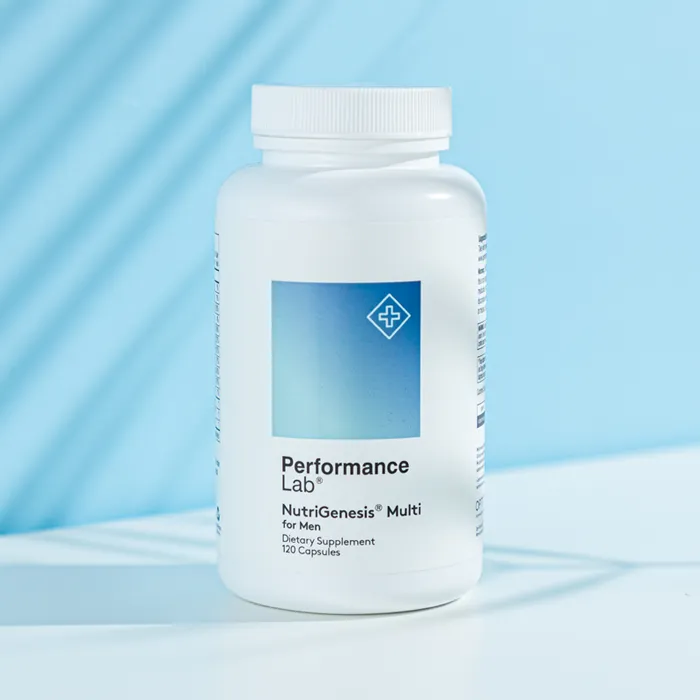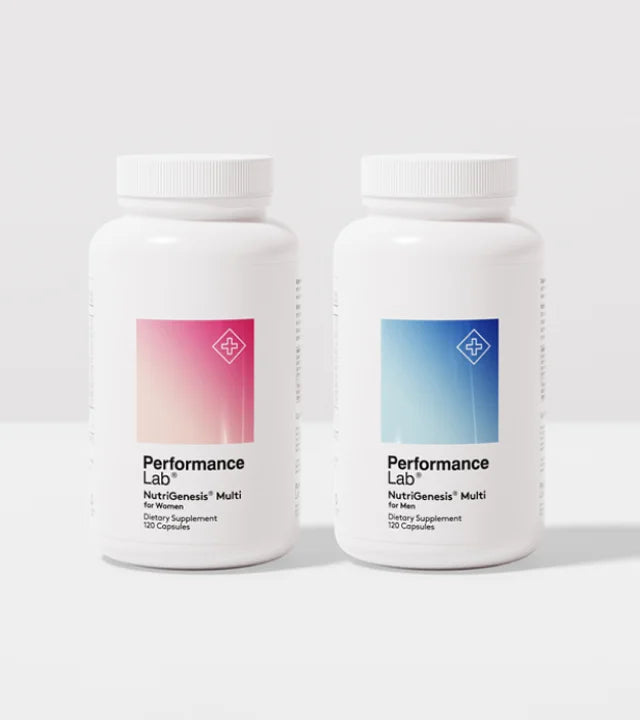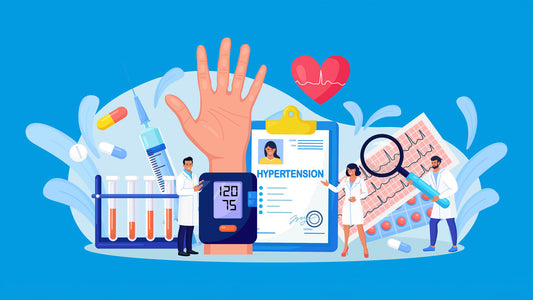As we all start to age, meeting healthy nutritional needs becomes more important than ever.
Because although we might not feel any different to when we were 30, let’s just say… things aren’t working as efficiently as they used to. As we age, the body's defenses naturally weaken, making it harder to absorb nutrients and maintain overall health.
As we move through our 50s, 60s and 70s, our body has a harder time absorbing and utilizing vitamins and minerals in the same way. Resulting in us requiring more of them to maintain good health. (1) Supplementation may help bridge the gaps.
In this article, we look at the specific vitamins and minerals that may benefit women over 70.
We’ll also go through symptoms to keep an eye out for. The ones that could simply be down to not getting enough vitamins and minerals.
Finally, we’ll look at what the best multivitamin is for women over 70. What nutrient forms to look out for, how to check bioavailability, and how to know if it’s a quality supplement.
Let’s get to it!
Key Takeaways
- Women aged 70+ face distinct nutritional needs (bone health, heart health, absorption issues, higher physiological stress) and thus benefit from a targeted multivitamin. :contentReference[oaicite:4]{index=4}
- Top-tier formulas for this age group emphasise clean, easy-to-absorb nutrients, minimal artificial additives, and dosage calibrated for older female physiology. :contentReference[oaicite:5]{index=5}
- Look for forms such as NutriGenesis® (or equivalent) which support absorption and gut tolerance, especially as digestive capacity changes. :contentReference[oaicite:6]{index=6}
- A multivitamin is useful as “nutritional insurance” but should be paired with good diet, movement, sleep and other seniors-friendly habits—not seen as a replacement.
- Before selecting a multivitamin, check that it aligns with your personal health status (bone density, cardiovascular risk, medications) and ideally consult your physician.

Why Multivitamins for Women Over Age 70?

First off, pretty much everyone in every age group can benefit from a good quality multivitamin supplement. But getting enough nutrition is especially important for women over the age of 50.
Women typically start having more difficulty absorbing and utilizing dietary nutrients around the age of 45-50. (2) Often coinciding with perimenopause, menopause and age-related physiological changes, these stages are marked by significant hormonal changes. Fluctuations in hormones can impact nutrient absorption and increase the risk of deficiencies.
Dietary absorption and utilization of nutrients may worsen as women age through their 60s and 70s.
This has been attributed to further declines in digestive efficiency and other changes, including:
Age-Related Changes
- Stomach acid production decreases: Stomach acid is needed to digest food, release enzymes that aid with digestion, and generally keep pathogens out of the GI tract. But optimal stomach acid is also necessary to absorb certain nutrients like calcium, zinc, magnesium, iron, folate, vitamin C, beta-carotene, and vitamin B12. (3)
- Microbiome Loses Efficiency: The gut's colony of beneficial bacteria (microbiome) can decline as we age, weakening the gut's ability to break down and absorb nutrients. Probiotic supplements and prebiotic supplements can help restore a healthy microbiome and support nutrient breakdown and synthesis in the gut. (4)
- Some medications: Some prescription drugs can negatively impact nutritional status in women over 70 by interfering with nutrient absorption and utilization, contributing to deficiencies, or altering metabolism. (5)
- Stress and Mood: Stress can be a big issue when it comes to depleting nutrients. Things like B vitamins are especially susceptible to depletion during periods of stress, not to mention they can't be stored in the body, so replenishing them regularly is important.
- Less caloric intake: Women over 70 often have suboptimal nutrient levels partly due to lower overall caloric intake, which can lead to insufficient consumption of essential nutrients. (6) Eating a balanced diet can help meet nutritional needs, but it may be challenging for women over 70 to get enough nutrients from food alone.
Even with the best intentions, it can be difficult to get all the nutrients you need from food as you age. This is why multivitamins are often recommended for women over 70. Certain vitamins become especially important as women age, so reading labels can help ensure these are included in a supplement.
Women's Nutritional Needs Change After 70
Today, the U.S. government recommends that women over the age of 70 increase their intake of several essential nutrients compared to earlier ages to address age-related changes and maintain optimal health.
These important vitamins and minerals include:
-
Calcium: Increase daily intake from 1,000 mg per day (for ages 19-50) and 1,200 mg per day (for ages 51-70) to 1,200 mg per day to support bone health and overall skeletal strength. (7)
-
Vitamin D: Increase from 600 IU (15mcg) per day (for ages 19-70) to 800 IU (20mcg) per day to enhance calcium absorption, fight bone loss and maintain bone health. Bonus benefits for skin health, immune function, mood balance and more. (8)
-
Vitamin B6: Increase from 1.3 mg per day (for ages 19-50) to 1.5 mg per day (for over 50s) to support brain health and cognitive function. (9)
-
Vitamin B12: While the recommended intake remains at 2.4 mcg per day across all adult ages, the emphasis on B12 increases after age 70 due to decreased absorption efficiency with age. This vitamin assists with cell energy, cardiovascular health, brain health and more in senior years. (10)
Other beneficial nutrients include:
-
Niacin: An essential B vitamin that supports energy production, metabolic health, and cardiovascular function, especially important for older adults.
-
Biotin: Supports healthy skin, hair, and nails, and plays a role in metabolic functions and overall wellness for women over 70.
-
Copper: A vital trace element that contributes to cell health, immune function, and maintaining nutritional balance in a comprehensive supplement formula.
-
Vitamin C or ascorbic acid (a natural form of vitamin C often included in high-quality multivitamins) is important for immune support and antioxidant protection.
These adjustments to mineral and vitamin amounts help address specific health concerns such as bone density, cognitive function, and overall nutrient absorption in women over 70. Helping you to have an active healthy life.
Why Age-Related Nutrient Problems Affect Women More than Men.

As we age, our bodies naturally change. And with each stage, our nutritional needs have changed right along with them.
For this reason and others, it’s important to buy a multivitamin that is intended specifically for women’s unique nutritional needs after age 70. These are some of the key vitamins and minerals for women in their 70s and beyond: (1, 6)
-
Calcium: Women, especially postmenopausal women, are more prone to osteoporosis due to a decline in estrogen levels, which affects calcium absorption and bone density. This makes adequate calcium intake crucial for older women to maintain bone health. (11)
-
Vitamin D: One of the best vitamins for women over 70. Women are more likely to have lower levels of vitamin D as they age. Vitamin D is essential for calcium absorption and strong bones, and deficiencies can lead to an increased risk of fractures and osteoporosis. (11)
-
Iron: Iron oxygenates red blood cells. After menopause, women’s iron requirements decrease, but some older women may still struggle with iron deficiency anemia if their diets are not well-balanced. They may feel fatigued, unmotivated and diminished in overall health.
-
Vitamin B12: Both men and women experience a decline in the absorption of vitamin B12 with age due to reduced stomach acid production. However, women are often more susceptible to B12 deficiency, which can affect overall energy.
-
Magnesium: Older women are more likely to have lower magnesium levels, which can affect muscle function, heart health, and bone density.
-
Folate: Although folate needs are generally similar for older men and women, women may have a slightly higher risk of deficiency due to differences in diet and absorption efficiency.
Addressing these nutrient declines through diet, supplementation, and attention to bioavailability is particularly important for women as they age. While supplements can help fill nutritional gaps, they should not be seen as a substitute for a healthy diet, but rather as a way to support overall wellbeing.
Multivitamins May Support Healthy Aging in Women
Women over 70 can choose many different pathways to get the essentials they need for overall health. They can consume more wholesome and nutrient-dense foods, and eat foods fortified with the essentials.
Women over the age of 70 may need to pay closer attention to their essential nutrient intake to stay ahead of age-related health concerns linked to suboptimal nutrient status. Some of these concerns:
Energy

To maintain a fun and active lifestyle, we need to have the basics for cell energy metabolism. But many women in their seventies fall short on vitamins for energy like the B-Complex, vitamin C, vitamin D, and vitamin A, plus mineral magnesium.
Immune Support
A woman's immune system can weaken with age. Vitamins C and E, along with zinc and selenium, are essential nutrients in multivitamins that nourish the immune system throughout the aging process. (2)
Bone Health
As women turn 70 and beyond, essential nutrients like calcium, vitamin D, vitamin K2, and magnesium become increasingly crucial for maintaining bone health and providing crucial structural support against weak bones. Calcium and vitamin D in particular have been suggested to help prevent osteoporosis. (11)
Heart Health

Vitamins C, D, and E, along with minerals like magnesium, potassium, and omega-3 fatty acids, support overall cardiovascular health. B vitamins, particularly B6, B12, and folic acid, help regulate homocysteine levels, making them top vitamins for 70 year old woman with heart concerns.
Eye Health
Nutrients like vitamin A, vitamin C and vitamin E (plus plant antioxidants lutein and zeaxanthin) support eye health and may help with age-related macular concerns.
Studies into Age-Related Macular Degeneration (AMD)
Two large scale studies have suggested that supplements featuring the above nutrients may slow down progression of AMD by 25% in certain cases. (12)
Cognitive Function
Many older adults over age 70 may have health concerns related to memory, mood and mental sharpness. Vitamins B6 (pantothenic acid), B12, vitamin D and E are all beneficial for brain health and cognitive function, as is the mineral magnesium.
Results of Clinical Trials
A study published in the American Society for Nutrition tested the effects of multivitamin supplementation over three years on 3562 older adults. It concluded that "daily multivitamin supplementation, compared with placebo, improves memory in older adults." (13)
The study authors said: "Multivitamin supplementation holds promise as a safe and accessible approach to maintaining cognitive health in older age".
Another study of 21,442 US adults aged 60 and over concluded that a daily multivitamin slowed global cognitive aging by two years on average. (14)
Did you know? Omega-3 fatty acids, often from fish oil but also now from plant sources, are additional supplements for women over 70 to consider for long-range brain health and mood balance.
Muscle Mass
For women over 70 looking to maintain lean body mass, helpful essential vitamins and minerals include vitamin D, calcium, magnesium, and protein (amino acids), as well as omega-3 fatty acids.
Factors to Consider When Choosing a Multivitamin

When choosing a multivitamin, it’s important to take a holistic approach that considers your unique health profile and lifestyle.
Think about your daily diet and activity level. If your diet is lacking in key nutrients like vitamin D, calcium, or magnesium - essential for bone health, heart health, and overall health - a multivitamin can help fill those gaps.
Always read labels carefully to ensure the supplement contains the right balance of vitamins and minerals, and check for any allergens, preservatives, or artificial ingredients that you may wish to avoid.
Look for a formula that is free from unnecessary additives and is designed to support women’s health as you age.
If you have a medical condition, consult your doctor or healthcare provider first as certain supplements can interact with some medications.
What to Look for in a Multivitamin for Women Over 70
The only multi I’ve used and noticed more energy and better overall wellbeing!Jerrold N

Selecting the right multivitamin for women over 70 means focusing on a formula that addresses the specific nutritional needs that come with aging.
Look for a comprehensive formula that includes essential vitamins and minerals such as vitamin C and vitamin E, which help support the immune system and heart health, as well as folic acid for nerve function.
Calcium and magnesium are especially important for bone health and can help reduce the risk of osteoporosis, a common concern for women in this age group.
Antioxidants like selenium are also valuable, as they help protect your cells from damage and support overall health.
Since the body’s ability to absorb nutrients can decrease with age, choose a multivitamin that is formulated for easy absorption and is gentle on the stomach. This ensures you get the most benefit from each dose without discomfort.
By prioritizing these important ingredients and features, you can find a multivitamin that supports your nutritional needs, helps maintain your health, and fits comfortably into your daily routine.
Non-GMO and Made in USA Options
If you value supplements that are non-GMO and made in the USA, we have you covered. Performance Lab vitamins are non-GMO, made in the U.S. and use high-quality, natural ingredients, following strict quality control standards to ensure safety and effectiveness.
Tips for Taking Multivitamins Effectively
To maximize the benefits of your multivitamin and support your overall health, it’s important to take your supplement correctly.
Always follow the directions on the label and stick to the recommended dosage - taking more than advised can cause unwanted side effects, while taking less may not provide enough nutritional support. Performance Lab NutriGenesis Multi for Women can be taken with or without food.
Establishing a daily routine by taking your multivitamin at the same time each day can help you remember to take it consistently. Be patient, as it may take several weeks to notice the benefits of your new supplement.
If you have any concerns or experience any side effects, consult your healthcare provider for advice. By following these tips, you can ensure your multivitamin works effectively to support your health and well-being.
What Is the Best Multivitamin for a 70-Year-Old Woman?
The best multivitamin for women in their seventies must tick all the boxes. Superior quality. Clean and natural, for easy digestion. Highly bioavailable nutrients. Precisely balanced gender-specific dosages.
Performance Lab® NutriGenesis® Multi for Women

Performance Lab® NutriGenesis® Multi for Women is a clean easy-to-absorb multivitamin supplement for a woman over age 70.
It supplies 24 vitamins and minerals presented as easy-to-absorb NutriGenesis®, with dosages customized just for women.
NutriGenesis® is completely free of hard-to-absorb synthetic nutrients and isolated nutrient forms -- just clean, natural nutrients, complete with cofactors, just like nutrients from food sources.
Ultraclean Performance Lab® design, too: Vegan, gluten-free, with no synthetic additives, colors or preservatives of any kind.
Shop Performance Lab® NutriGenesis®
Boost Nutritional Status: Performance Lab® Prebiotic

Prebiotic fiber feeds gut probiotics (good bacteria) to build a thriving microbiome that supports digestion, mood, energy, nutritional status and more.
Performance Lab Prebiotic boosts probiotic Bifidobacterium in the gut, which enhance calcium, magnesium, iron and zinc absorption; as well as supporting natural synthesis of B-vitamins and vitamin K in the gut.
Prebiotic's key is Orafti® Synergy1: Oligofructose-enriched inulin (Inulin-FOS) from chicory root. Research shows taking 10g of Orafti® Synergy1 per day boosts calcium absorption by 20% and magnesium absorption by 10% in post-menopausal women. (15)
Shop Performance Lab® Prebiotic
Performance Lab® D3+K2

Performance Lab D3+K2 combines plant-based vitamin D3 (from algae) with vitamin K2 (as NutriGenesis®) for an extra shot of two key essentials to help keep bones strong, the heart healthy, and immune system in tip-top shape.
Vitamin D3 and Vitamin K2: two dietary supplements paired into one due to their synergistic effects on bone and cardiovascular health.
Vitamin D3 helps the body absorb calcium from the diet and vitamin K2 directs it into bones and teeth, helping to keep it out of blood vessels.
For older women seeking an extra boost of the sunshine vitamin for their heart health and bone health, this is a clean vitamin K + vitamin D supplement that works.
Conclusion
Many foods can help women over age 70 to stay healthy. A daily diet of green leafy vegetables, citrus fruits, fortified breakfast cereals and other fortified foods, whole grains and wholesome staples in our diet can lay a good foundation of all the nutrients we all need for health.
But women over 70 may want to reinforce that structure with a good multivitamin. Consider the ones we talked about in this article.
References
- Institute of Medicine (US) Food Forum. Nutrition Concerns for Aging Populations: Providing Healthy and Safe Foods as We Age: Workshop Summary. Washington (DC): National Academies Press (US), 2010. https://www.ncbi.nlm.nih.gov/books/NBK51837/
- Kassis, A., M. C. Fichot, M. N. Horcajada, A. M. H. Horstman, P. Duncan, G. Bergonzelli, N. Preitner, D. Zimmermann, N. Bosco, K. Vidal, and L. Donato-Capel. “Nutritional and Lifestyle Management of the Aging Journey: A Narrative Review.” Frontiers in Nutrition 9 (2023): 1087505. https://doi.org/10.3389/fnut.2022.1087505
- WebMD. “What Is Hypochlorhydria?” https://www.webmd.com/digestive-disorders/what-is-hypochlorhydria
- Peters, B. A., N. Santoro, R. C. Kaplan, and Q. Qi. “Spotlight on the Gut Microbiome in Menopause: Current Insights.” International Journal of Women’s Health 14 (2022): 1059–1072. https://doi.org/10.2147/IJWH.S340491
- Mohn, E. S., H. J. Kern, E. Saltzman, S. H. Mitmesser, and D. L. McKay. “Evidence of Drug–Nutrient Interactions with Chronic Use of Commonly Prescribed Medications: An Update.” Pharmaceutics 10, no. 1 (2018): 36. https://doi.org/10.3390/pharmaceutics10010036
- Robinson, S. M. “Improving Nutrition to Support Healthy Ageing: What Are the Opportunities for Intervention?” Proceedings of the Nutrition Society 77, no. 3 (2018): 257–264. https://doi.org/10.1017/S0029665117004037
- National Institutes of Health, Office of Dietary Supplements. “Calcium: Fact Sheet for Health Professionals.” https://ods.od.nih.gov/factsheets/Calcium-HealthProfessional
- National Institutes of Health, Office of Dietary Supplements. “Vitamin D: Fact Sheet for Consumers.” https://ods.od.nih.gov/factsheets/VitaminD-Consumer/
- National Institutes of Health, Office of Dietary Supplements. “Vitamin B6: Fact Sheet for Health Professionals.” https://ods.od.nih.gov/factsheets/VitaminB6-HealthProfessional
- National Institutes of Health, Office of Dietary Supplements. “Vitamin B12: Fact Sheet for Health Professionals.” https://ods.od.nih.gov/factsheets/VitaminB12-HealthProfessional/
- MedlinePlus. “Calcium, Vitamin D, and Your Bones.” https://medlineplus.gov/ency/article/002412.htm
- Macular Society. “Nutrition.” https://www.macularsociety.org/support/daily-life/practical-guides/healthy-living/nutrition/#supplements
- Yeung, L. K., D. M. Alschuler, M. Wall, H. Luttmann-Gibson, T. Copeland, C. Hale, R. P. Sloan, H. D. Sesso, J. E. Manson, and A. M. Brickman. “Multivitamin Supplementation Improves Memory in Older Adults: A Randomized Clinical Trial.” The American Journal of Clinical Nutrition 118, no. 1 (2023): 273–282. https://doi.org/10.1016/j.ajcnut.2023.05.011
- Massachusetts General Hospital Psychiatry News. “Multivitamin–Mineral Supplement Slows Age-Related Cognitive Decline in Older Adults.” https://mghpsychnews.org/multivitamin-prevents-cognitive-decline-older-adults/
- Holloway, L., S. Moynihan, S. A. Abrams, K. Kent, A. R. Hsu, and A. L. Friedlander. “Effects of Oligofructose-Enriched Inulin on Intestinal Absorption of Calcium and Magnesium and Bone Turnover Markers in Postmenopausal Women.” British Journal of Nutrition 97, no. 2 (2007): 365–372. https://doi.org/10.1017/S000711450733674X
















